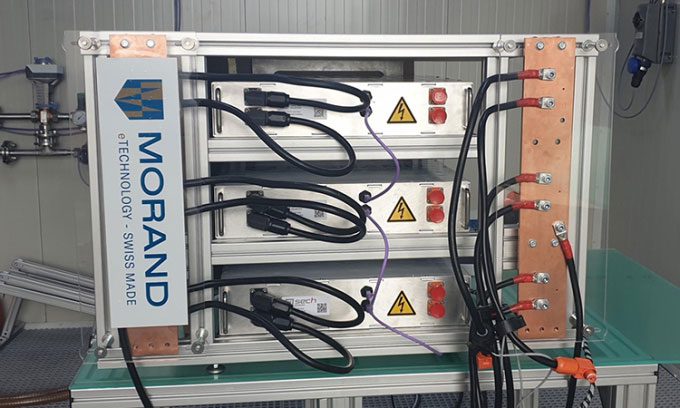Swiss Startup Develops Hybrid System Utilizing Traditional Battery and Supercapacitor Technology, Aiding the Popularization of Electric Vehicles with Fast Charging.
The average time to refuel an internal combustion engine vehicle is two minutes, according to the American Petroleum Institute. Swiss startup Morand has developed a new battery technology that allows electric vehicles to charge in an extremely short time, comparable to the refueling time for internal combustion engine vehicles at gas stations, Interesting Engineering reported on November 22.

eTechnology prototype can charge 80% in just over a minute. (Photo: Morand)
The new technology, named eTechnology, is a hybrid system that combines traditional battery technology with supercapacitors, promising to encourage more people to use electric vehicles. Another advantage of this new technology is its significantly longer lifespan compared to the lithium-ion batteries typically used in electric vehicles.
In testing, the 7.2 kWh eTechnology prototype was able to charge up to 80% in just 72 seconds, 98% in 120 seconds, and 100% in 2.5 minutes at 900 A or 360 kW. Batteries over 100 kWh in the world’s longest-range electric vehicles cannot charge as quickly, but according to Morand, the new technology is very suitable for smaller city vehicles, such as the Citroën Ami with a 5.5 kWh battery. This technology could also be beneficial for drones and electric bicycles that require fast charging.
Morand estimates that a 6 Ah electric bicycle battery could charge in 6 minutes at a lower rate of 3.2 kW using this new technology. This could significantly boost electric bicycle usage, reduce reliance on purchasing spare batteries, and make electric bicycles a more viable option for many people.
The team at Morand has tested the eTechnology prototype for over 50,000 cycles and confirms that this technology shows potential for maintaining capacity over more charge/discharge cycles than traditional lithium-ion batteries. The new technology also operates efficiently in extreme temperatures, something that electric vehicle batteries often struggle with.
Morand is collaborating with a partner to bring eTechnology to market. Initially, it may be more expensive than lithium-ion batteries, but Morand aims to scale production to reduce costs in the future.


















































